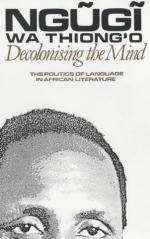
|
| Name: _________________________ | Period: ___________________ |
This test consists of 15 multiple choice questions and 5 short answer questions.
Multiple Choice Questions
1. When was This Time Tomorrow written?
(a) 1972.
(b) 1966.
(c) 1959.
(d) 1945.
2. What does "Caitaani mutharaba-Ini" translate to in English?
(a) I Will Marry When I Want.
(b) Devil on the Cross.
(c) A Meeting in the Dark.
(d) Mother Sing for Me.
3. The process of production for Ngaahika Ndeenda, from research, writing, auditions, and rehearsals as well as construction of the theater took how much time?
(a) Nine months.
(b) Two years.
(c) Six months.
(d) Three months.
4. What performance troupe first performed The Trial of Dedan Kimathi?
(a) The Kenya Festac 77 Drama Group.
(b) The Nairobi National Theatre Group.
(c) Ghana’s Concert Party theatre.
(d) The Ibadan Drama Group Festac 76.
5. What was the wall made of that stood at the back of the stage at Kamĩrĩĩthũ?
(a) Mud.
(b) Bamboo.
(c) Mesh cloth.
(d) Stucco.
6. How large was the work force of the Bata shoe factory at the time when Ngaahika Ndeenda was produced?
(a) 1,000.
(b) 5,000.
(c) 3,000.
(d) 2,000.
7. The author notes in his Introduction that the study of African realities has been seen for too long in terms of what?
(a) Poverty.
(b) Tribes.
(c) Illiteracy.
(d) War.
8. What does the word "Maitũ" translate to in English?
(a) Bride.
(b) Mother.
(c) Sister.
(d) Father.
9. The author states in Chapter 2, Part V that "In the opening line of The Black Hermit the peasant mother is made to speak in a poetic language reminiscent in tone of" whom (43)?
(a) Edgar Allan Poe.
(b) Byron.
(c) Shakespeare.
(d) T.S. Eliot.
10. What word from the text refers to something relating to the theory of knowledge, especially with regard to its methods, validity, and scope?
(a) Epistemological.
(b) Orinthogical.
(c) Linguistical.
(d) Pseudoliteral.
11. Wangeci's monologue from the excerpt of Ngaahika Ndeenda in the text describes the Olengurueni women who were exiled to where?
(a) Eskista.
(b) Yatta.
(c) Aduma.
(d) Nakuru.
12. What novel of the author's did he hope to give a transcript of to Chinua Achebe at the writers' conference described in Chapter 1, Part II?
(a) Caitaani mũtharaba-Inĩ.
(b) The River Between.
(c) A Grain of Wheat.
(d) Weep Not, Child.
13. What were largely featured as the main characters in the stories that Ngũgĩ wa Thiong’o grew up listening to as a child?
(a) Goddesses.
(b) Animals.
(c) Gods.
(d) Women.
14. When was Things Fall Apart published?
(a) 1959.
(b) 1962.
(c) 1969.
(d) 1982.
15. Who wrote Betrayal in the City?
(a) Francis Imbuga.
(b) Obi Wali.
(c) Alan Paton.
(d) Léopold Sédar Senghor.
Short Answer Questions
1. What does the author describe as a constant theme in the stories that he grew up listening to?
2. When was Ngũgĩ wa Thiong’o arrested as a result of the production of Ngaahika Ndeenda?
3. What does the Ituĩka ceremony mark?
4. Where was Janheinz Jahn from?
5. The author states in Chapter 1, Part IV, "Language as culture is the collective memory bank of a people's" what (15)?
|
This section contains 507 words (approx. 2 pages at 300 words per page) |

|




